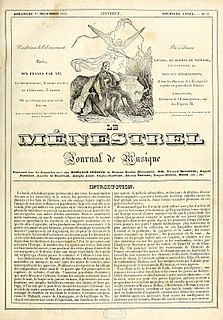Romain-Jean-François Hartmann, commonly known as Georges Hartmann was a French music publisher, dramatist and opera librettist.
Louis Charles Félix François Gregh was a French composer and music publisher.

The Éditions Alphonse Leduc company is a prominent French music publishing house specializing in classical music. It was created in Paris in 1841. Since January 2014, Leduc is part of the Wise Music Group.
Éditions Maurice Senart was an important French music publisher founded by Maurice Senart operating in Paris from 1908 to 1941.

Le Ménestrel was an influential French music journal published weekly from 1833 until 1940. It was founded by Joseph-Hippolyte l'Henry and originally printed by Poussièlgue. In 1840 it was acquired by the music publishers Heugel and remained with the company until the journal's demise at the beginning of World War II. With the closure of its chief rival, La Revue et gazette musicale de Paris in 1880, Le Ménestrel became France's most prestigious and longest-running music journal.

Paul-Louis Rougnon was a French composer, pianist and music educator.
Marie-Auguste Massacrié-Durand was a French music publisher, organist, and composer.
Jacques Victor Léon Escudier was a prominent French journalist, music critic and music publisher.
Auguste O'Kelly was a Franco-Irish music publisher in Paris between 1872 and 1888.
Antony (de) Choudens was one of the most notable French music publishers and an occasional composer.
"La veuve Boivin" real name Élisabeth Catherine Boivin, widow of François Boivin and Jean-Christophe Ballard's daughter, was an 18th-century French music publisher in Paris.
Charles Mayol was a French music publisher.

Jean-Jérôme Imbault was a French violinist and music publisher at the end of the 18th century and the beginning of the 19th century.
Pierre Leduc or Le Duc was a French violinist and music publisher, active from 1775 to 1811.
EugèneLouisDemets was one of the most prestigious music publishers in early 20th-century Paris.

François Lesure was a French librarian and musicologist.

Jean-Racine Meissonnier, also called Meissonnier Jeune, was a French classical guitarist, musical arranger and composer, as well as an important music publisher.

Éditions Durand are a music publishing company of French origin, among the most important in the field of classical music, which includes three previously independent publishers:
Marie-Jacques Massacrié-Durand was a French music publisher and composer, sometimes under the pseudonym J. Samm. The family's publishing house, Éditions Durand, published works by many of Durand's contemporaries, including Claude Debussy, Paul Dukas, Gabriel Fauré, Jacques Ibert, Darius Milhaud, Maurice Ravel and Camille Saint-Saëns.
François Victor Antoine Magnien was a French violinist, guitarist, conductor, teacher and composer.







